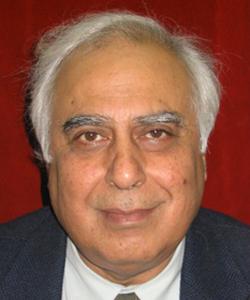Partnerships key to overcoming climate change challenge: Sibal
 New Delhi, Jan. 21 : Union Minister for Science and Technology and Ocean Development, Kapil Sibal, today said that there were four kinds of technologies prevalent in the world today that could facilitate climate change.
New Delhi, Jan. 21 : Union Minister for Science and Technology and Ocean Development, Kapil Sibal, today said that there were four kinds of technologies prevalent in the world today that could facilitate climate change.
First, those that can be used by the small and medium enterprises that are otherwise very polluting. For example technology that converts waste to energy. India’s agricultural wastes have a total potential of yielding 80,000 MW of power.
Second, water technologies that result in converting polluted water to drinking water.
Third, transgenic technologies that enable better agricultural methods, like low-water cropping and
Fourt, health and disease control technologies that make low-cost health care possible for the poor.
Addressing the Indo-UK CEOs Round Table on Climate Change and Corporate Responsibility here, Sibal exhorted the corporate world to look at these technologies with a degree of responsibility, and with a desire "to change ourselves and not the planet."
Sibal claimed that climate change negatively impacts the southern countries much more than the developed world.
“The solution is not easy. Enormous economic opportunities exist. The Clean Development Mechanism is like a “feel good” factor, and much more needs to be done. Indian cement and steel plants are among the best in the world, but power generation is still very polluting. We need to move away from coal. The only way out were partnerships: between government and business, and between governments," Sibal said.
Richard Lambert - Director General of CBI - said climate change represented an inter-generational and inter-regional challenge. He acknowledged the fact that India’s energy use and emissions were far lesser than UK and USA.
The primary role of government was to create a policy framework and encourage good practices, while that of business was to improve production capability, quality of services and communication to their customers.
He recommended a four pronged strategy to move ahead: convergence, better technologies, overcoming barriers of intellectual property rights, and making markets work better.
Speaking at the event, Lord Digby Jones said China and the USA represented about half the world’s pollution, and while aid was not a long-term solution, methods to eradicate poverty must necessarily be sustainable. The meet was a call to action to industry.
The CBI and the CII both recently released reports about the way forward to overcome ill effects of climate change.
Of the total energy used, a third is by business, another third by transport and the remainder by private individuals. The new Climate Change Bill in the UK Parliament envisaged binding CO2 reduction targets, zero emission new homes and 60 percent reduction of emissions in UK by 2050.
Welcoming the participants, the CII President and Chief Executive of Bharti Enterprises, Sunil Bharti Mittal, said Indian industry was committed to the cause of development and taking care of the environment.
While the Indian economy was growing at 10 percent, India’s carbon emissions grew only at 3.7 percent. Also, while the US had a per capita annual oil consumption of 26 barrels, China used 2 barrels and India 0.5 barrels. Indian industry wanted to grow responsibly.
The CII and the CBI signed a shared Statement of Intent for Collaborating on Tackling Climate Change.
Among the prominent business persons who attended the Round Table were Arun Sarin (Vodafone) and Richard Branson (Virgin Atlantic) amongst a delegation of 40 persons from the UK, and Arun Bharat Ram (SRF), Phiroze Vandrewala (TCS), Y C Deveshwar (ITC), Naina Lal Kidwai (HSBC), Analjit Singh (Max) and others from the India side. (ANI)
